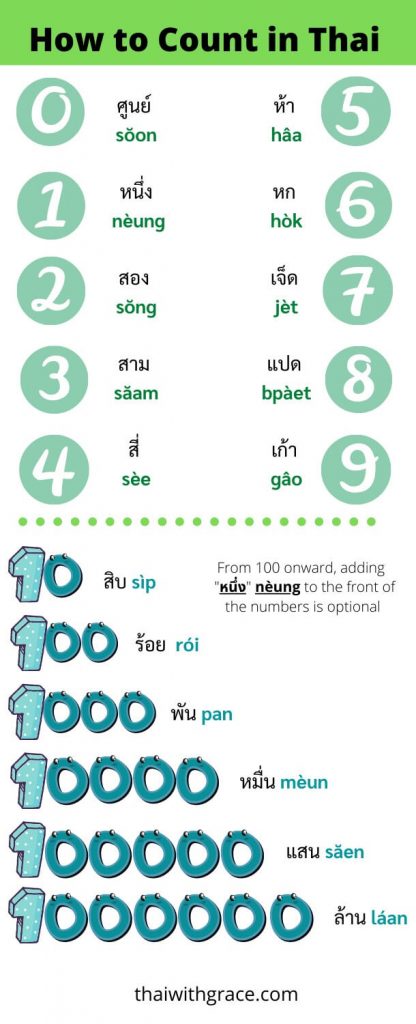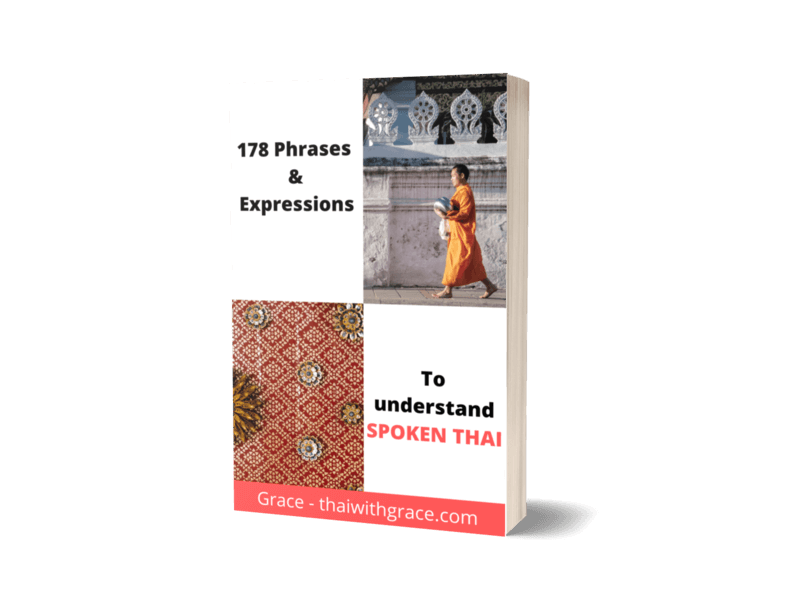Being able to count in Thai is very important. You will always be running into situations where you need to count something, say the quantity, calculate something, etc. Luckily counting in Thai isn’t very difficult.
In this article, I will teach you everything you have to know.
Counting in Thai
Important Exceptions
#1 When 1 is in the last digit instead of หนึ่ง nèung you say เอ็ด èt. You will see some examples below.
#2 For numbers in the 20’s instead of saying สอง สิบ sŏng sìp, you say ยี่สิบ yêe sìp. We’ll see some examples below.
#3 From 100 onward if the number starts with 1 (for example 100, 1,000, 10,000 …) the หนึ่ง (nèung) before the number is optional. Take a look at the examples below. When there is a bracket (หนึ่ง) it means it is optional.
0 – 10
0 = ศูนย์ sŏon
1 = หนึ่ง nèung
2 = สอง sŏng
3 = สาม săam
4 = สี่ sèe
5 = ห้า hâa
6 = หก hòk
7 = เจ็ด jèt
8 = แปด bpàet
9 = เก้า gâo
10 = สิบ sìp
11-99
To count from 11 – 99 you say the number followed by สิบ (sìp 10). Before looking at some examples, let’s learn some important exceptions:
Please note: In spoken colloquial Thai instead of ยี่สิบ yêe sìp you can shorten it to ยีบ yêep. So 23 would be ยีบสาม yêep săam.
Let’s see some examples:
11 = สิบเอ็ด sìp èt (look at the highlighted text above to see explanation #1)
16 = สิบหก sìp hòk
19 = สิบเก้า sìp gâo
21 = ยี่สิบเอ็ด yêe sìp èt (look at the highlighted text above to see explanation #2)
23 = ยี่สิบสาม yêe sìp săam
34 = สามสิบสี่ săam sìp sèe
61 = หกสิบเอ็ด hòk sìp èt
97 = เก้าสิบเจ็ด gâo sìp jèt
100 – 999
100 = (หนึ่ง)ร้อย (nèung) rói
120 = (หนึ่ง)ร้อยยี่สิบ (nèung) rói yêe sìp
131 = (หนึ่ง)ร้อยสามสิบเอ็ด (nèung) rói-săam-sìp-èt
566 = ห้าร้อยหกสิบหก hâa-rói-hòk-sìp-hòk
999 = เก้าร้อยเก้าสิบเก้า gâo-rói-gâo-sìp-gâo
1,000 – 9,999
1,000 = (หนึ่ง)พัน (nèung) pan
1,220 = (หนึ่ง)พันสองร้อยยี่สิบ (nèung) pan-sŏng-rói yêe sìp
1,600 = (หนึ่ง)พันหกร้อย ( nèung) pan-hòk rói
3,000 = สามพัน săam pan
7,400 = เจ็ดพันสี่ร้อย jèt-pan-sèe-rói
10,000 – 99,999
10,000 = (หนึ่ง)หมื่น (nèung) mèun
10,621 = (หนึ่ง)หมื่นหกร้อยยี่สิบเอ็ด (nèung) mèun-hòk rói yêe sìp èt
40,703 = สี่หมื่นเจ็ดร้อยสาม sèe-mèun-jèt-rói-săam
60,200 = หกหมื่นสองร้อย hòk-mèun-sŏng-rói
100,000 – 999,999
100,000 = (หนึ่ง)แสน (nèung) săen
120,321 = (หนึ่ง) แสนสองหมื่นสามร้อยยี่สิบเอ็ด (nèung) săen-sŏng-mèun-săam-rói yêe sìp èt
700,771 = เจ็ดแสนเจ็ดร้อยเจ็ดสิบเอ็ด jèt-săen-jèt-rói-jèt-sìp-èt
1,000,000
1,000,000 = (หนึ่ง)ล้าน (nèung) láan
6,079,001 = หกล้านเจ็ดหมื่นเก้าพันเอ็ด hòk láan-jèt-mèun-gâo-pan-èt
For 10 million and above:
For each zero you add on to the number after 1 million, you multiply by 1 million. For example, 10 million is 1 million times 10 so it would be สิบล้าน (10 and 1 million). 1 billion is 1,000 times 1 million so 1 billion is พันล้าน (1 thousand and 1 million). Please see more examples below.
10 million = สิบล้าน (nèung) sìp-láan
100 million = (หนึ่ง)ร้อยล้าน (nèung) rói-láan
1 billion = (หนึ่ง)พันล้าน (nèung) pan láan
1 trillion = (หนึ่ง)หมึ่นล้าน (nèung) mèun láan
1 quadrillion = (หนึ่ง)แสนล้าน (nèung) săen-láan
1 quintrillion = (หนึ่ง)ล้านล้าน (nèung) láan-láan

Decimals
Decimals in Thai are pretty easy. Simply put จุด jùt (which means dot) in between the number and the decimal. For example:
10.2 = สิบ จุด สอง sìp jùt sŏng
121.1 = หนึ่งร้อยยี่สิบเอ็ดจุดหนึ่ง nèung rói yêe sìp-èt-jùt nèung
Other things to note
Thai has IT’S OWN NUMERAL. Although, most of the time in Thailand you will see regular numbers you might sometimes encounter Thai numerals. To learn about them please visit my other article here.
A very important use of numbers is to be able to COUNT OBJECTS. However, Thailand has a very particular way of counting objects that require the use of CLASSIFIERS. Once you know how to count in Thai then you should learn how to use classifiers to correctly count objects. To learn about classifiers please see my article here.
Extra Vocabulary:
how much (baht is Thai’s currency) = กี่บาท gèe bàat
how much (money wise) = เท่าไร tâo rai
number = เบอร์ / หมายเลข ber / măai lâyk
count = นับ náp
plus (to add) = บวก bùak
minus (subtract) = ลบ lóp
multiply = คูณ koon
divide = หาร hăan
decimals = ทศนิยม tót-sà-ní-yom

